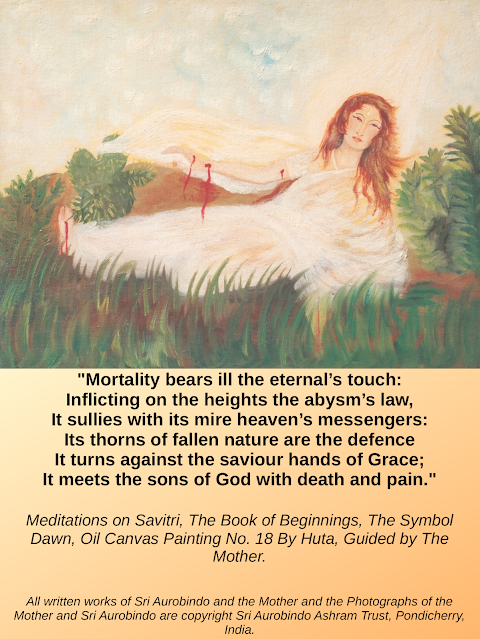A synthesis of Savitri and Theosophy - Painting No 18
Page 7, Savitri (A Legend, Symbol, the Mantric Epic of Sri Aurobindo), Lines 215 to 233.
"In vain now seemed the splendid sacrifice.
A prodigal of her rich divinity,
Her self and all she was she had lent to men,
Hoping her greater being to implant
And in their body’s lives acclimatise
That heaven might native grow on mortal soil."
Sri Aurobindo says: The coming of Savitri in a human form on Earth was a splendid sacrifice. She came in immense generosity, leaving her blissful place to bestow all she was, her very self to humanity, hoping to implant all the divine possibilities of the higher planes here on earthly soil. She had hoped to accustom all her own divinity as a normal part of life on earth so that the higher qualities of nature could become a part of everyday lives of natives, born here, belonging here.
"Hard is it to persuade earth-nature’s change;
Mortality bears ill the eternal’s touch:
It fears the pure divine intolerance
Of that assault of ether and of fire;
It murmurs at its sorrowless happiness,
Almost with hate repels the light it brings;
It trembles at its naked power of Truth
And the might and sweetness of its absolute Voice."
It is difficult to induce a change in the mortal-nature (which is the earth or lower-nature) of humanity. It is hard for mortal humans to bear the divine touch, which is so pure and intense, that it doesnot tolerate our impurity of earth-nature. An assault fire is the one delivered by attacking troops as they close with the enemy. The divine-touch is experienced as an assault fire by the earth-nature trapped in fear. When the divine messenger approaches with an offer of sorrowless happiness, the earth-nature complains and with hatred pushes back the higher light of the divine touch. It cannot bear and shakes with fear at the bare power of Truth that can expose all its insincerity or pretence. Even the sound of the sweet, mighty, absolute Voice of the divine is heard as terrifying by the deaf earth-nature mortals.
"Inflicting on the heights the abysm’s law,
It sullies with its mire heaven’s messengers:
Its thorns of fallen nature are the defence
It turns against the saviour hands of Grace;
It meets the sons of God with death and pain."
The earth-nature resisting truth and love, insists on applying the law of ignorance and separation of its lower mortal nature onto the higher consciousness of a divine messenger. Throwing filth and mud, it taints or pollutes the divine messengers. It tries defending the change in it's fallen-nature from the saviour hands of divine Grace, using the thorns of its perverted nature. When these divine messengers or Avatars come, mortality meets them with nothing better but only death and pain.
Huta paints a picture of the divine messenger - Savitri made to bleed against thorny defence of mortal earth-nature. The symbolic words of Sri Aurobindo reminds us of other divine messenger - Jesus with a crown of thorns the true mystery being revealed in theosophy by Blavatsky and Bailey.





Comments
Post a Comment